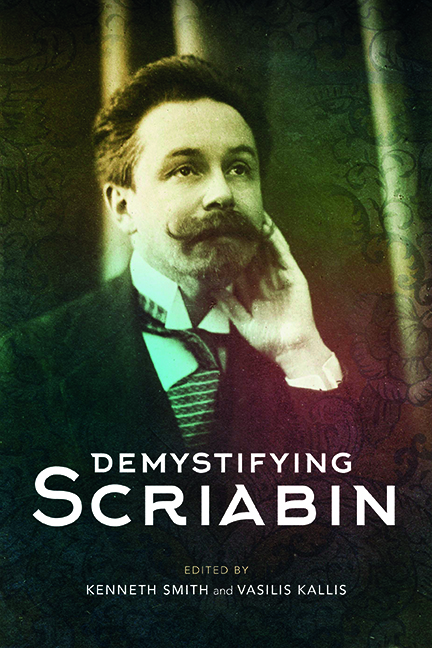14 - Scriabin and Music Analysis: The Search for theHoly Grail
Published online by Cambridge University Press: 07 October 2022
Summary
‘Scriabin always said that everything in hislater compositions was strictly according to“law”. He said that he could prove this fact.However, everything seemed to conspire against hisgiving a demonstration. One day he invited Taneevand me to his apartment so he could explain histheories of composition. We arrived and hedilly-dallied for a long time. Finally, he said hehad a headache and would explain it all anotherday. That “another day” never came. Scriabin, wasobviously afraid of Taneev's destructivecriticism.’ (de Schloezer 1987, 129)
Typical Scriabin. When Aleksandr Gol’denveĭzerregistered this account in his memoirs, he could notat the time comprehend the full import of thedescribed events; the composer's ‘method’ wouldbecome the Holy Grail to the music theoreticalcommunity. For the following decades, pitchconstruction would be the focus of those engagingwith the theoretical and analytical aspects ofScriabin's music with issues of form and rhythmbarely getting a look-in. Even more remarkable isthe fact that, despite the numerous – and on severaloccasions rather illuminating – articles and bookson the matter, there is still an ongoing debateabout the ‘what’ and the ‘how’ that characterise thecomposer's late style.
This chapter appraises the history and historiographyof the theoretical literature that refers toScriabin's late (post-tonal) style as well as thetransitional period since, in some respects, itprefigures aspects of compositional practice foundin the post Op. 58 repertory. Scriabin's‘post-tonal’ period lasted for no more than sixyears, a timeframe scarcely proportional to theamount of attention it has received. Scriabinhimself was notoriously parsimonious about hismethod of pitch organization, even to close friendssuch as Sabaneev. Interestingly, it took more thansix decades after the composer's death to unearthhis primary pitch resources, and the debatescontinue. To understand why, one needs to tell thestory from its beginning. In actual fact, from thebeginnings, sinceScriabin's historiographical chronicle comprisesmultiple narratives largely unfolded on at least twocontinents. The search of this origin takes us backto a group of Russian/Soviet musicologists, namelyBoleslav Iavorskiĭ, Leonid Sabaneev, and, muchlater, Varvara Dernova, as well as interestedparties in Britain such as Arthur EaglefieldHull.
- Type
- Chapter
- Information
- Demystifying Scriabin , pp. 269 - 281Publisher: Boydell & BrewerPrint publication year: 2022



